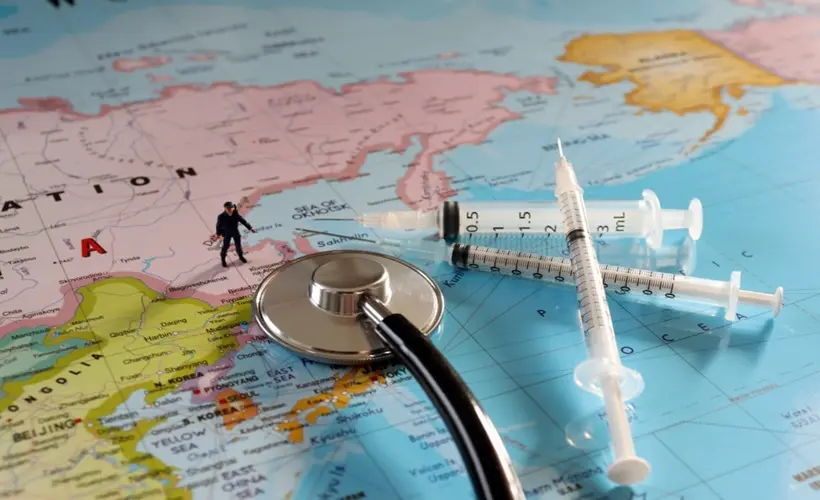Preparing for international travel often means more than booking flights and packing bags—it also involves protecting your health. Travel vaccination plays a vital role in safeguarding you from infectious diseases that may be common in other parts of the world. While vaccines are safe and highly effective, it’s important for travelers to be aware of possible side effects so they can plan ahead and feel confident about their protection. At Swift Clinics, we specialize in providing travel immunizations and guiding patients through what to expect before and after their shots.
Common Side Effects of Travel Vaccination
Mild Reactions You May Experience
Most people experience little to no side effects from vaccines, but when they do occur, they are usually mild and temporary. Common reactions include:
- Soreness, redness, or swelling at the injection site
- Low-grade fever or fatigue for a day or two
- Headache or mild muscle aches
These effects typically resolve within 24–48 hours and are considered a normal response.
Why These Reactions Happen
Mild side effects are a sign that your body is building immunity. Vaccines stimulate your immune system to recognize and fight off certain infections without causing the actual illness. The soreness, mild fever, or fatigue are temporary indicators that your immune system is responding as intended. Knowing this reassures travelers that these side effects are not harmful but part of the protection process.
Less Common but Notable Side Effects
Moderate Reactions
While less frequent, some individuals may experience moderate side effects depending on the type of travel vaccination they receive. These may include:
- Mild rash, sometimes linked with vaccines like MMR (measles, mumps, rubella) or yellow fever
- Digestive upset, such as temporary nausea or stomach discomfort
- Swollen lymph nodes, which usually resolve on their own
These reactions are generally short-lived and do not require medical treatment.
Rare Reactions That Require Attention
On very rare occasions, vaccines can trigger more serious reactions. While uncommon, it’s important to recognize the warning signs:
- Severe allergic reaction (anaphylaxis) – symptoms may include difficulty breathing, rapid heartbeat, or facial swelling
- High fever that persists
- Severe rash or prolonged skin reaction
If any of these symptoms occur, seek medical care immediately. Fortunately, these events are extremely rare, and travel vaccination clinics like Swift Clinics are fully trained and equipped to manage them if they arise.
How to Manage Side Effects After Travel Vaccination
Travelers can usually manage minor side effects at home with simple care strategies:
- Easing injection site discomfort: Apply a cool compress or gently move the arm to reduce soreness.
- Rest and hydration: Give your body time to recover and stay well-hydrated.
- Over-the-counter medications: Pain relievers such as acetaminophen or ibuprofen may help with fever, aches, or swelling (if recommended by your healthcare provider).
- Monitor your symptoms: Keep an eye out for anything unusual, especially if it lasts longer than a couple of days.
These small steps often make recovery more comfortable and stress-free.
When to Seek Medical Advice
Most side effects are temporary, but there are times when you should check in with a healthcare professional:
- Symptoms lasting longer than a few days without improvement
- Severe or unexpected reactions, such as intense pain, rash, or high fever
- Concerns before your next dose or booster, especially if you had a strong reaction to a previous vaccine
Swift Clinics encourages all travelers to reach out if they’re unsure about their side effects. Professional guidance ensures peace of mind and keeps your travel health plans on track.
Why Travel Vaccination Is Still Essential
Even though side effects can happen, the benefits of travel vaccination far outweigh the risks. Vaccines protect against serious diseases such as yellow fever, typhoid, and hepatitis A, as well as meningitis—illnesses that can derail travel plans and pose severe health risks.
Skipping vaccines can leave travelers vulnerable to infections that may be difficult or expensive to treat abroad. By comparison, mild side effects like a sore arm or slight fever are temporary inconveniences. At Swift Clinics, we prioritize safety by using trusted vaccines, providing thorough pre-travel consultations, and ensuring patients understand both the benefits and possible side effects of their immunizations.
Prepared Travelers Are Protected Travelers
While most travel vaccination side effects are mild and temporary, being informed helps travelers stay calm and prepared. From minor soreness to rare reactions, knowing what to expect ensures a safe and confident start to your journey. Above all, vaccines remain one of the most effective ways to protect your health when traveling internationally.
Ready for your next trip? Book your travel immunization appointment with Swift travel Clinics today and travel with peace of mind.
